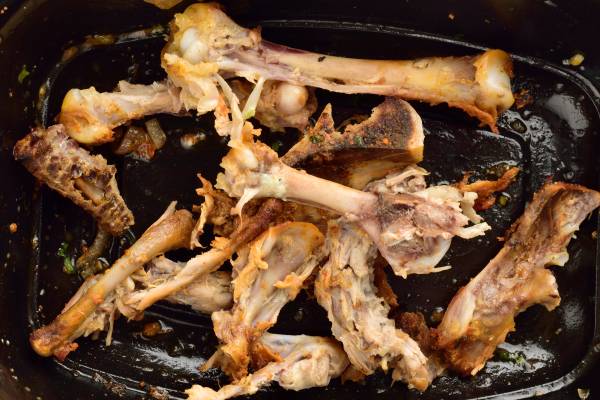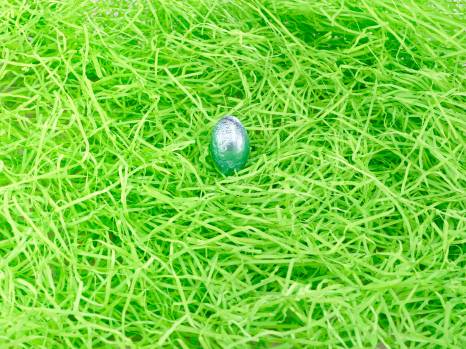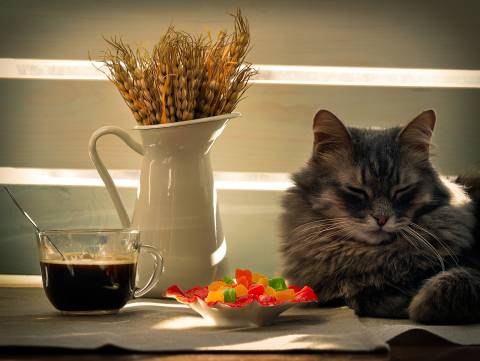Connect with a verified veterinarian in minutes. Licensed vets are available 24/7 to answer your questions. No need to worry about your furry family member.
Fried chicken makes an amazing meal. Nothing is better than warm, crispy chicken along with some potato salad or coleslaw! As you enjoy your chicken, your cat may come up and show some interest, too. But if you don’t share with your fur baby, she may try to help herself. She may grab an unattended chicken wing or thigh and then eat the entire thing, bones and all! But what happens if a cat eats chicken bones?
Has your cat eaten chicken bones? Are you worried the chicken bones will make your cat sick? If so, you’ve come to the right place. We understand it can be scary when your cat eats something like this.
We’ve gathered information about chicken bones and whether they can make a cat sick. Let’s get started!
The Potential Problems with Chicken Bones
Cooked bones, such as chicken bones, can be dangerous to humans and their feline friends. The problem is that chicken bones are hollow, and when they’re cooked, the bones become dry and brittle. If a cat bites into cooked chicken bones, the bone could shatter and create sharp splinters.
These sharp bone splinters can cause injuries to the mouth, esophagus, stomach, and intestines. The injuries can include cuts, tears, punctures, and more. When a part of the digestive tract is torn or punctured, there’s a danger of intestinal contents leaking into the cat’s abdomen. This can lead to peritonitis, which can cause death.
Raw chicken bones are slightly safer, but they can also cause problems. The bones could become stuck in the throat and cause a cat to choke. They could also become lodged in the digestive tract and cause an obstruction. This is a serious condition that can cause death if left untreated.
In other cases, a cat may eat raw chicken bones and not suffer any problems. The cat’s digestive system may digest the bones, with some bone fragments coming out in her poop.
Symptoms of Chicken Bone Ingestion in Cats
You may notice these symptoms if your cat has eaten chicken bones:
- Choking/gagging/difficulty breathing
- Vomiting
- Abdominal pain & swelling
- Lethargy
- Lack of appetite
- Constipation
- Diarrhea
If you notice any of these symptoms in your cat, call the vet immediately. This is an emergency. Do not induce vomiting, as the bone could cause more damage when the cat brings it up.

Review symptoms, medications & behavior to keep your pets healthy with a Vet Online in just minutes.
Ask a Vet Live NowTreatment of Chicken Bone Ingestion in Cats
Treatment depends on the vet’s diagnosis. For instance, if your cat is choking, the vet will remove the chicken bone from your fur baby’s esophagus. This may be done with an endoscopic procedure if the vet is unable to reach the bone otherwise.
If your cat has suffered a blockage, the vet will need to perform surgery to remove the chicken bones safely. And for a tear in the intestines, the vet may also have to perform surgery.
The prognosis is best for cats who receive prompt medical care after eating chicken bones. In the future, it’s a good idea to keep all chicken bones out of your cat’s reach. If she likes to dig in the trash for these treasures, you may want to consider a dog-proof wastebasket in the kitchen. You’ll both be happier for it!
Connect with a verified veterinarian in minutes. Licensed vets are available 24/7 to answer your questions. No need to worry about your furry family member.

Julie
Julie is a graduate of the University of North Carolina, Wilmington, where she studied Animal science. Though contrary to the opinion of her parents she was meant to study pharmacy, but she was in love with animals especially cats. Julie currently works in an animal research institute (NGO) in California and loves spending quality time with her little cat. She has the passion for making research about animals, how they survive, their way of life among others and publishes it. Julie is also happily married with two kids.
Review symptoms, medications & behavior to keep your pets healthy with a Vet Online in just minutes.
Ask a Vet Live Now




